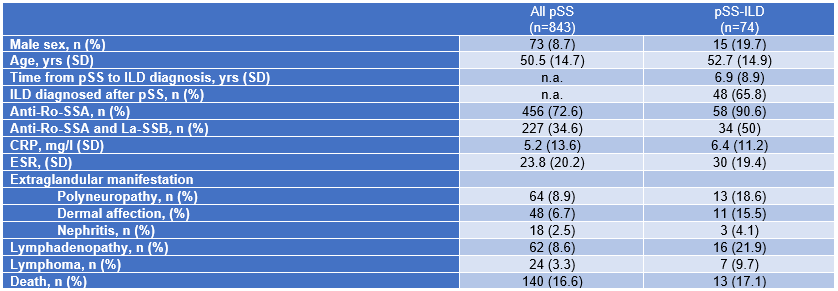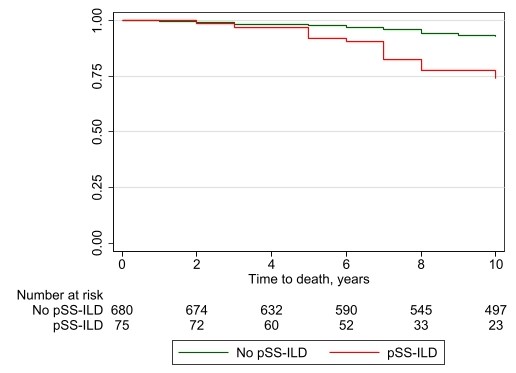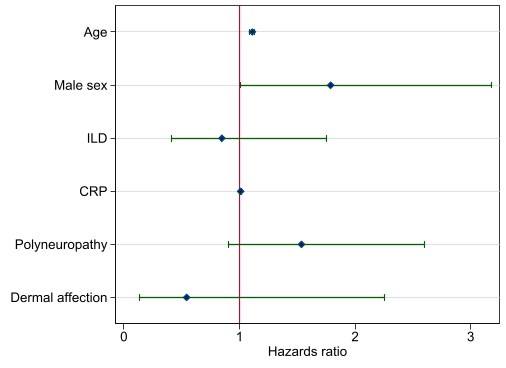Session Information
Date: Monday, November 13, 2023
Title: (1365–1382) Sjögren’s Syndrome – Basic & Clinical Science Poster I
Session Type: Poster Session B
Session Time: 9:00AM-11:00AM
Background/Purpose: Interstitial lung disease (ILD) has been reported to be present in 10-15% of patients with primary Sjögren’s syndrome (pSS). Knowledge on risk factors predicting the development of ILD in pSS and its impact on long-term outcome is limited and no standardized disease management exists, including screening and monitoring. The aim of this project was to evaluate the presence of ILD in pSS, assess risk factors for the development of ILD and its impact on mortality.
Methods: This is an international multicenter study including patients with pSS with and without ILD from expert centers. All patients fulfilled the 2016 ACR-EULAR classification criteria for pSS. ILD was diagnosed on high resolution computed tomography (HRCT) assessed by expert radiologists in each center. Comprehensive clinical characteristics, lung function tests including forced vital capacity (FVC) and diffusing capacity for carbon monoxide (DLCO) were available. Vital status was assessed at last available observation. We applied multivariable Cox regression to assess risk factors predicting ILD and mortality, presented as hazard ratio (HR) with 95% confidential interval (CI). Survival was assessed using Kaplan-Meier estimates.
Results: The study cohort included a total of 843 patients with pSS; 9% were male, age at time of pSS diagnosis was 51.5 (SD 15.1) years, 72.6% were positive for anti-Ro-SSA and 34.6% for both anti-Ro-SSA and anti-La-SSB (Table).
In total, 498 (59%) patients were assessed by HRCT. Of these, 76 (15%) were diagnosed with ILD (Table). Of all pSS-ILD patients, 21 (33%) were diagnosed with ILD at time point of or prior to the diagnosis of pSS, while 48 (67%) were diagnosed in a mean follow-up of 11 (SD 8.2) years after diagnosis of pSS.
In these 48 patients, we assessed risk factors for the development of pSS-ILD and found that male sex, increased inflammatory markers, reduced complement factor C3, presence of interstitial nephritis and absence of arthritis were predicting development of ILD in univariable Cox regression. In multivariable Cox regression, only older age predicted ILD development.
Over mean 15.9 (SD 8.9) years follow up, 140 (16%) pSS patients died. ILD was associated with impaired survival with a reduced 10-year survival from 93% to 74% in patients without and with ILD (p=0.001) (Figure 1). In multivariable Cox regression, male sex, older age and increased inflammatory markers were associated with mortality (Figure 2).
Conclusion: Based on the relatively high prevalence of ILD in pSS and its significant impact on long-term survival, we suggest that screening strategies should be developed and that at least patients at risk of ILD development should be screened on a regular basis. As pSS-ILD patients have a reduced long-term outcome, regular monitoring is of outmost importance.
To cite this abstract in AMA style:
Sprecher M, Weber F, Kastrati K, Prosch H, Moe N, Langballe E, Bruni C, Molberg O, Diep P, Clarenbach C, Studenic P, Andersson H, Midtvedt O, Garen T, Lerang K, Frauenfelder T, Radner H, Distler O, Hoffmann-Vold A. Interstitial Lung Disease Is Frequent in Primary Sjögren’s Syndrome and Is Associated with Reduced Survival [abstract]. Arthritis Rheumatol. 2023; 75 (suppl 9). https://acrabstracts.org/abstract/interstitial-lung-disease-is-frequent-in-primary-sjogrens-syndrome-and-is-associated-with-reduced-survival/. Accessed .« Back to ACR Convergence 2023
ACR Meeting Abstracts - https://acrabstracts.org/abstract/interstitial-lung-disease-is-frequent-in-primary-sjogrens-syndrome-and-is-associated-with-reduced-survival/



